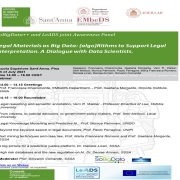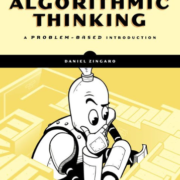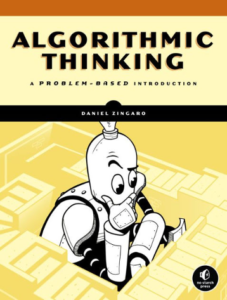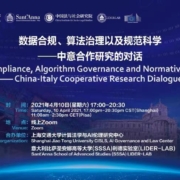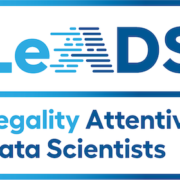SoBigData++ and LeADS joint Awareness Panel
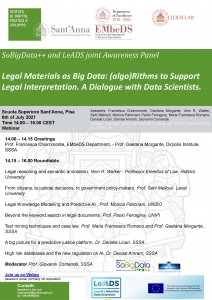
SoBigData++ and LeADS joint Awareness Panel.
Legal Materials as Big Data: (algo)Rithms to Support Legal Interpretation. A Dialogue with Data Scientists.
This panel is organized, in the framework of the Predictive Justice Project, coordinated by Giovanni Comandé, and aims to intensify the dialogue among scientists and jurists: Professors and Researchers of the Sant’Anna School of Advanced Studies but also international speakers will discuss the topic of the legal material as ‘’big data’’ to be explored.
The event that will be held in english is an initiative of the research activities of the LeADS and SoBigData++ Projects promoted by the LIDER Lab of the Dirpolis Insititute and aims to explain how data scientists analyze the case-law materials and promote its potentialities also in terms of research methodologies in Legal Sciences.
Piattaforma Webex
14.00 – 14.15 Greetings
Prof. Francesca Chiaromonte, EMbeDS Department, – Prof. Gaetana Morgante, Dirpolis Institute, SSSA
14.15 – 16.00 Roundtable
Legal reasoning and semantic annotation, Vern R. Walker – Professor Emeritus of Law, Hofstra University
From citizens, to judicial decisions, to government policy-makers, Prof. Sehl Mellouli, Laval University
Legal Knowledge Modelling and Predictive AI., Prof. Monica Palmirani, UNIBO
Beyond the keyword search in legal documents, Prof. Paolo Ferragina, UNIPI
Text mining techniques and case law, Prof. Maria Francesca Romano and Prof. Gaetana Morgante, SSSA
A big picture for a predictive justice platform, Dr. Daniele Licari, SSSA
High risk databases and the new regulation on AI, Dr. Denise Amram, SSSA
Moderator Prof. Giovanni Comandè, SSSA
password: panel (normally not requested)


